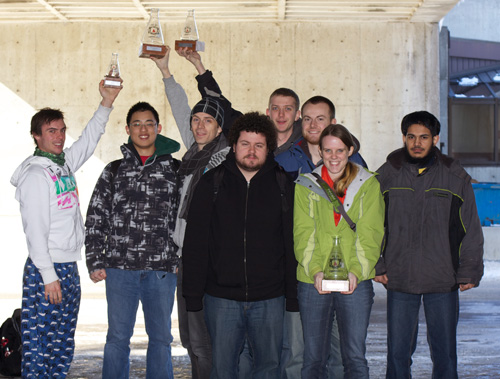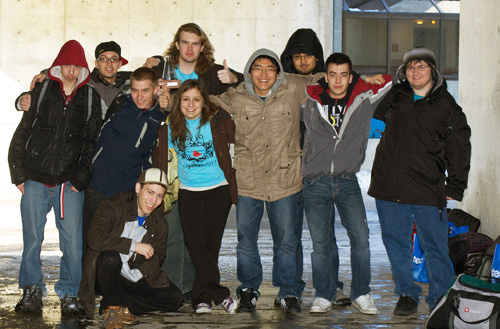
“It’s a chance to show how strong the computer science program at U of G is,” says Ali Tremblay, a fourth-year computer science student. “We have a relatively small program here, but we do pretty well at the CS Games.”
Indeed they do. The 2011 Computer Science Games (CS Games) were held at Concordia University in early March, and U of G’s “Team Redundancy Team” chaired by fourth-year student Laura Richards placed eighth overall out of 31 teams. “We also came home with four awards for competition: first place in algorithms, first in the scavenger hunt, second in extreme programming and third in sports. We were the highest-scoring team from Ontario,” says Richards. She was the team member who won the algorithms competition.
U of G also sent a team of first-year students called “Team Équipe.” They placed 23rd overall. “That’s really good for a first-year team,” says Richards. “They were pretty nervous about going and thought they’d be dead last, but they stepped up and did really well.”

For third-year student Chad Chabot, this was his third time attending the CS Games; he competed in the scavenger hunt and sports events. His team was also fourth in the game development event. “Guelph has earned its place at the CS Games; people are recognizing the strength of our program,” he says.
What are computer science games like? Richards explains that competitors in algorithms were given a booklet of problems to solve; harder problems were worth more points. She gives an example: “You have a piece of wood, and you have to make cuts in it to make it smaller. The cost of each cut depends on the size of the piece of wood you are cutting. So the challenge is to develop an algorithm that will give you the lowest-cost way to cut the wood. This is all done on paper, not on the computer.”
Adds Chabot: “It helps to refine your thinking when you are presented with a really challenging problem. Most of these are designed to be too daunting to actually finish, so there’s strategy involved as well, as you assess the problems and decide which you can do most easily and still get a good point score in the three hours you have to work on it.”
Tremblay, who is on the executive of the University’s Society of Computing and Information Science (SOCIS), says the choice of problems that can’t actually be finished makes it less like a school assignment. She didn’t participate in the CS Games this year but remembers a past competition where the assigned problem was to recreate Photoshop. “There isn’t the pressure to finish or to do only what is expected; you just jump in and start programming. And that’s fun.”
SOCIS organizes the teams to attend the CS Games each year; Tremblay has overseen this organization for the past two years. Many students are fully-funded, and all have the opportunity for partial sponsorship through the School of Computer Science and SOCIS.
Richards and Chabot both mention getting to meet other students with an interest in computers as a highlight of the event. “It pulls students from across Canada and the U.S., so it’s a chance to network with others who share your interests,” Richards explains. Chabot says that after having attended for three years, he looks forward to seeing again the friends he made in the past.
But new friendships aren’t the only benefit; the CS Games, while entirely student-run, are sponsored by organizations like Microsoft, Amazon and Google. Participants who do well have their resumes sent to the corporations and can also meet with representatives at the event. “It’s a great way to learn what jobs are out there and to get your name known,” says Richards.
Next year may see the CS Games held much closer to home; Chabot and other students who took part this year have applied to host the event at U of G. “We’ve enjoyed attending the past few years, and we want to give back. The event has never been held outside of Quebec, but we think it’s time,” he says. “We are more than ready to host from a technical perspective, and we have the facilities we need on campus.”